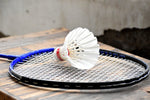
Caffeine Supplements for Badminton: Boosting Focus and Energy Levels Before Matches
, by Sandesh Prasannakumar, 7 min reading time
Stay tuned, Your Favourite supplements will be back in stock soon!
Stay tuned, Your Favourite supplements will be back in stock soon!
Stay tuned, Your Favourite supplements will be back in stock soon!
Stay tuned, Your Favourite supplements will be back in stock soon!
Stay tuned, Your Favourite supplements will be back in stock soon!
Stay tuned, Your Favourite supplements will be back in stock soon!
Stay tuned, Your Favourite supplements will be back in stock soon!
Stay tuned, Your Favourite supplements will be back in stock soon!
Stay tuned, Your Favourite supplements will be back in stock soon!
Stay tuned, Your Favourite supplements will be back in stock soon!

, by Sandesh Prasannakumar, 7 min reading time
Badminton is a fast and physically expressive encounter that requires energy, speed, balance, suppleness, and focus. Endurance is important in relation to performing at an optimal level during the games. Energy boosters are caffeine supplements that when properly used can help in performance by blocking adenosine receptors and increasing adrenaline, energy, attention, and focus. Nonetheless, its consumption in the wrong ways results in nervousness, anxiety, digestion complaints, increased heart rate, and sleepless nights. Thus, the general rationale for caffeine consumption is based on the understanding that it is possible to manage it in a proper way that will not lead to the deterioration of performance. This article unveils caffeine’s ergogenic effects, dose, timing, type, and interrelation with other nutrients for improved performance among badminton players.
Research on athletes reveals that moderate amounts of caffeine, measuring 3-6 mg per kilogram of body weight, are ideal for enhancing energy, power and focus. For a 150 lb (70 kg) badminton player, that equates to: For a 150 lb (70 kg) badminton player, that equates to:
- The daily caffeine intake for these products varies from 210 mg to 420 mg.
These moderate doses are safe from the adverse effects of excessive caffeine intake but also give one an energy boost. It’s always advised to go with the lower end of the range and gradually build up to the desired dosage that’ll be the best for you. Instead of taking large quantities at once, it was advised to divide the quantity into smaller parts that can be taken at different times.
Timing also plays a crucial part in using caffeine supplements in sports. The effects of caffeine in the blood usually rise after taking it, and it usually takes 45-90 minutes to reach its highest concentration. Badminton players should consume caffeine one hour before a match so that their energy and mental alertness will peak at a crucial time.
Other effects include its duration, which ranges from 4-6 hours. Where there are several matches in a day, relatively smaller doses of caffeine can be introduced after an initial performance-enhancing dose has been given.
However, Caffeine should not take at least 6 hours to bedtime to avoid interrupting the sleep cycle. When taking it later in the day, one needs to take smaller portions; otherwise, it might cause sleep disturbances, which affects the next day's productivity.
There are various supplemental forms of caffeine that badminton players can use:
As for most athletes who engage in badminton, you can be sure that they stick to the tried and tested methods of using coffee or tea for an effective dose of caffeine. Sometimes, caffeine pills, gels, or powder mix provide higher accuracy in the dosage before a strenuous performance.
Some supplements could work together with caffeine by further promoting mental stimulation, energy and focus. Popular supplement stacks include:
Use supplements during training sessions to try out the various blends you can come up with. However, additional or multiple ingredients can also lead to digestive discomfort in some consumers.
Consumption of caffeine supplements an hour before the match is ideal in moderate and research-backed doses that allow badminton players to gain considerable advantages over their counterparts. Different types of caffeine and specific complexations with other substances give a definite gain in the ability to focus, physical speed, and endurance.
But be wise and careful with the use of caffeine. Timing of caffeine, discovering personal ergogenic dose, adequate hydration practice, and avoiding the consistent practice of caffeine that forms tolerance form the basis to use caffeine as a performance-enhancing substance for badminton without adversely affecting the player's health.
For all your protein and supplement needs, visit Genetic Nutrition!
No. WADA eliminated caffeine from the prohibited substances list in 2004, and the Badminton World Federation excludes caffeine from its list. This means that it is now legal and fair to take caffeine during a badminton match. And that can apply to the matches at various club competitions, starting from the local ones and ending with the Olympics.
2. Do you get any adverse effects from high caffeine consumption?Yes. A person who regularly drinks cups of coffee containing over 600mg caffeine per day or more than 200mg as a cup could end up with a racing heart, anxiety, difficulty in sleeping, upset tummy, shaking and headache. Single doses exceeding 400mg could raise susceptibility to convulsions and rhythm disturbances.
3. Will caffeine cause dehydration?Caffeine has a mild diuretic effect because it increases the volume of urine produced. However, for badminton players, if they hydrate well and take caffeine in the recommended amount, as supported by researchers, caffeine is not likely to lead to the depletion of electrolytes or cause dehydration. However, it is important to pay some sensitivity to the state of hydration when taking caffeine during matches. Drinking electrolyte drinks can alleviate any losses, as it is advised to drink them to replenish the body’s fluids.
4. Can one develop tolerance to caffeine through its daily use?Indeed, with a daily intake of caffeine, the body will adapt quickly and counter-regulation measures in a week of regular usage. This means performance-boosting effects are unlikely to endure if caffeine intake is taken daily.